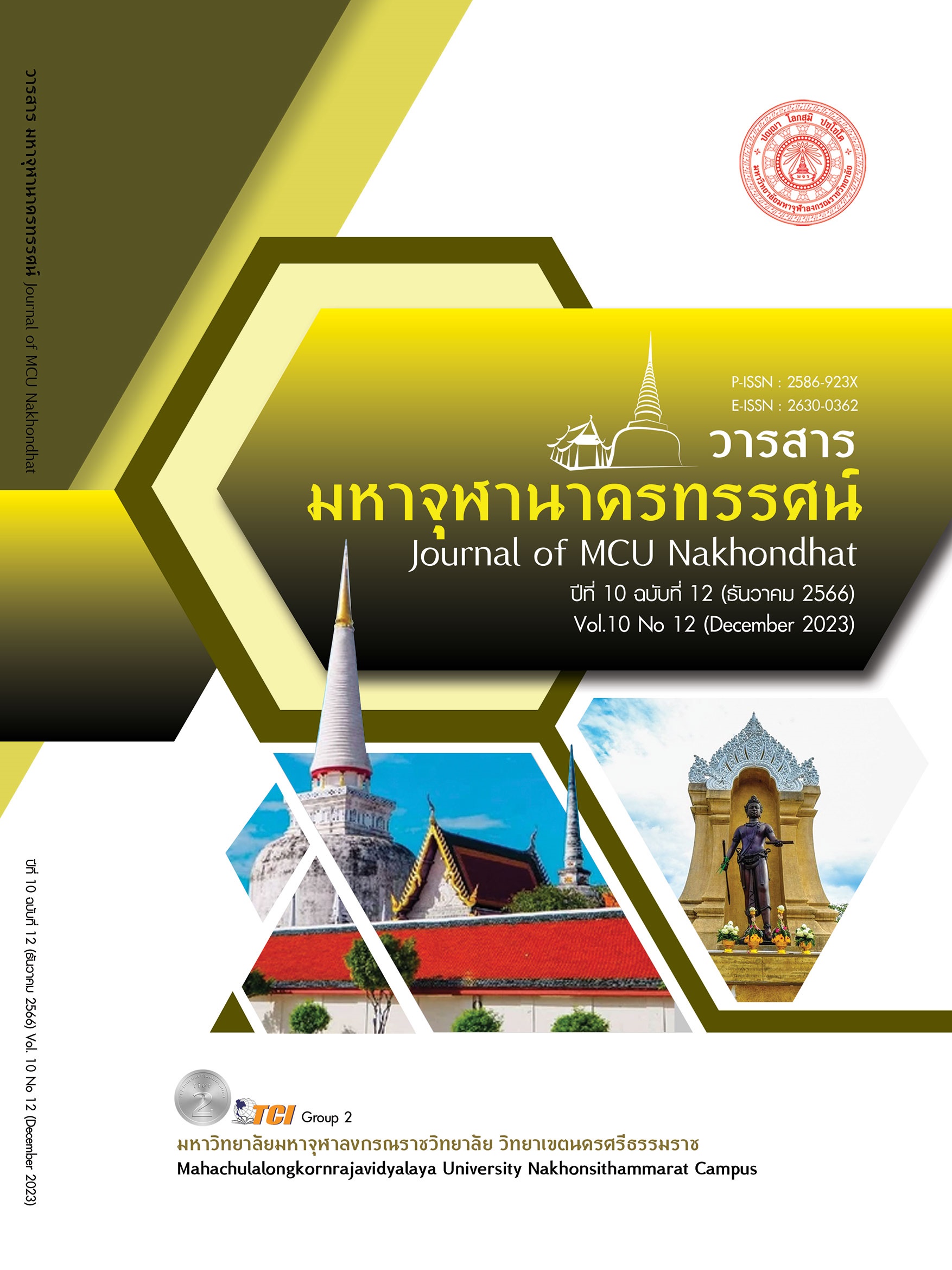DEVELOPING LIFE AND CAREER SKILLS FOR STUDENTS IN THE 21ST CENTURY
Main Article Content
Abstract
This article aims to present digital citizenship skills for students in the 21st century, This academic article aims to present digital citizenship skills for students in the 21st century, From synthesizing books, textbooks, journals, research, electronic databases and internet, consisting of 1) skills in maintaining a good identity of oneself, namely using skills to maintain a good identity of oneself both in Part of the online world and the real world, learning and developing communication with others. 2) Personal data protection skills are knowing how to protect personal data in the online world. Especially sharing information online. 3) Analytical thinking skills and good judgment are having the ability to analyze information correctly. Useful information By using your judgment and correct monitoring. 4) Skills in allocating screen time is having the ability to manage time using digital media. Including control to achieve balance. 5) Skills for dealing with online threats is having the ability to protect yourself from being bullied. Preventing being deceived by malicious users on the cyber world. 6) Skills in managing information that users leave online are skills in managing information that users leave online. and cyber scams 7) Skills for maintaining one's safety in the online world are skills for maintaining one's safety in the online world. Preventing data theft or online attacks 8) Skills in using technology Ethically is the skill to use technology with compassion and build good relationships.
Article Details

This work is licensed under a Creative Commons Attribution-NonCommercial-NoDerivatives 4.0 International License.
References
กระทรวงดิจิทัลเพื่อเศรษฐกิจและสังคม. (2562). พลเมืองดิจิทัล. กรุงเทพมหานคร: กระทรวงดิจิทัลเพื่อเศรษฐกิจและสังคม.
กระทรวงเทคโนโลยีสารสนเทศและการสื่อสาร. (2559). การเสริมสร้างและเตรียมเยาวชนไทยในโลกยุคศตวรรษที่ 21. กรุงเทพมหานคร: กระทรวงเทคโนโลยีสารสนเทศและการสื่อสาร.
กองบริการเทคโนโลยีสารสนเทศและการสื่อสาร. (2566). สรุปพระราชบัญญัติว่าด้วยการกระทำความผิดเกี่ยวกับคอมพิวเตอร์ (ฉบับที่ 2) พ.ศ. 2560. เรียกใช้เมื่อ 20 ธันวาคม 2566 จาก https://citcoms.nu.ac.th/ computer-2560/
กาญจนา เดชสม. (2564). การพัฒนากลยุทธ์การบริหารสถานศึกษาแบบดุลยภาพเพื่อพัฒนาความเป็นพลเมืองดิจิทัล. ครุศาสตร์วารสาร, 15(1), 69-78.
ณัฏฐ์ โอธนาทรัพย์ และคณะ. (2561). จริยธรรมในการใช้เทคโนโลยีสารสนเทศ. เรียกใช้เมื่อ 29 สิงหาคม 2566 จาก http://www.jaturapad.com/archives/679
ถวิล อรัญเวศ. (2566). จริยธรรมในการใช้เทคโนโลยีสารสนเทศและการสื่อสาร (ICT). เรียกใช้เมื่อ 29 สิงหาคม 2566 จาก https://www.gotoknow.org/posts/687074
ธิดา แซ่ชั้น และทัศนีย์ หมอสอน. (2559). การรู้ดิจิทัล:นิยาม องค์ประกอบ และสถานการณ์ในปัจจุบัน. วารสารสารสนเทศศาสตร์, 34(4), 12-21.
นิตยา วงศ์ใหญ่. (2560). แนวทางการพัฒนาทักษะการรู้ดิจิทัลของดิจิทัลเนทีฟ. วารสารมนุษยศาสตร์ สังคมศาสตร์และศิลปะ, 10(2), 73-82.
บงกช ทองเอี่ยม. (2561). การพัฒนาตัวชี้วัดทักษะการรู้ดิจิทัลของนักศึกษาวิชาชีพครูในมหาวิทยาลัยแบบไม่จำกัดรับ. วารสารวิชาการสถาบันเทคโนโลยีแห่งสุวรรณภูมิ, 4(1), 300-310.
ไพลินรัตน์ กุณสิทธ. (2561). การจัดการเชิงกลยุทธ์. กรุงเทพมหานคร: อมรการพิมพ์.
ภัคพนธ์ เจรณาเทพ. (2566). เทคโนโลยีการสร้างสรรค์สื่อดิจิทัล. เรียกใช้เมื่อ 29 สิงหาคม 2566 จาก https://library.wu.ac.th/km
มหาวิทยาลัยเกษตรศาสตร์. (2566). การจัดการเวลาใช้จอภาพดิจิทัล. เรียกใช้เมื่อ 29 สิงหาคม 2566 จาก https://learningdq-dc.ku.ac.th/course/?c=7&l=3
วรพจน์ วงศ์กิจรุ่งเรือง. (2561). คู่มือพลเมืองดิจิทัล. กรุงเทพมหานคร: กระทรวงดิจิทัลเพื่อเศรษฐกิจและสังคม.
แววตา เตชาทวีวรรณ และคณะ. (2559). การพัฒนาแบบวัดการรู้ดิจิทัลสำหรับนักศึกษาระดับปริญญาตรี. กรุงเทพมหานคร: มหาวิทยาลัยศรีนครินทรวิโรฒ.
สถาบันสื่อเด็กและเยาวชน. (2566). ทักษะความเป็นพลเมืองดิจิทัล คืออะไร สิ่งที่คนยุคดิจิทัลควรรู้เพื่อคุณภาพชีวิตที่ดีบนโลกดิจิทัล. เรียกใช้เมื่อ 29 สิงหาคม 2566 จาก http://www.childmedia.net/
สํานักงานเลขาธิการสภาการศึกษา. (2555). การส่งเสริมคุณลักษณะผู้เรียนยุคใหม่เพื่อรองรับการปฏิรูปการศึกษาในทศวรรษที่สองด้วยการบูรณาการไอซีทีในการจัดการเรียนรู้ด้วยโครงการ. กรุงเทพมหานคร: สํานักงานเลขาธิการสภาการศึกษา.
สำนักงานพัฒนาธุรกรรมอิเล็กทรอนิกส์. (2566). แนวทางการส่งเสริม ทักษะการตระหนักรู้ (ด้านความมีจริยธรรม ด้านการรู้กฎหมาย และด้านการป้องกันตนเอง). กรุงเทพมหานคร: สำนักงานพัฒนาธุรกรรมอิเล็กทรอนิกส์.
สำนักงานส่งเสริมสังคมแห่งการเรียนรู้และคุณภาพเยาวชน. (2565). ทักษะความฉลาดในการใช้ชีวิตพลเมืองของผู้เรียน. กรุงเทพมหานคร: สำนักงานส่งเสริมสังคมแห่งการเรียนรู้และคุณภาพเยาวชน (สสค.).
สำนักนายกรัฐมนตรี. (2566). ทักษะการใช้ดิจิทัล. กรุงเทพมหานคร: สำนักนายกรัฐมนตรี.
สุวรรณี ไวท์. (2564). ความเป็นพลเมืองดิจิทัล. วารสารมนุษยศาสตร์ปริทัศน์, 7(2), 347-355.
Common Sense Media. (2009). Digital Literacy and Citizenship in the 21st Century. Retrieved June 1, 2023, from https://www.itu.int/council/groups/wg-cop/secondmeetingjune- CommonSenseDigitalLiteracy-CitizenshipWhitePaper.pdf
Ministry of Education Singapore. (2014). Student Development Curriculum Division. Syllabus Cyber Wellness Secondary. Singapore: Ministry of Education.
Ryberg, T. & Georgsen, M. (2010). Enabling Digital Literacy: Development of Mesolevel Pedagogical Approaches. Nordic Journal of Digital Literacy, 5(2), 88-100.
Techataweewan, W. & Prasertsin, U. (2018). Development of digital literacy indicators for Thai undergraduate students using mixed method research. Journal of Social Sciences, 39(2), 215-221.
Unesco. (2011). Digital literacy in education. Retrieved June 1, 2023, from https://iite.unesco.org/ publications/3214688/
Unesco. (2014). Fostering Digital Citizenship through Safe and Responsible Use of ICT. Bangkok: Unesco.


